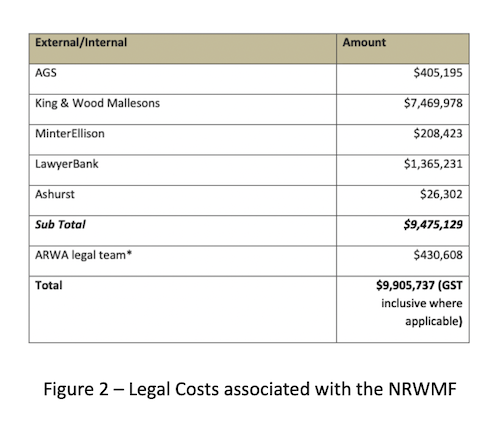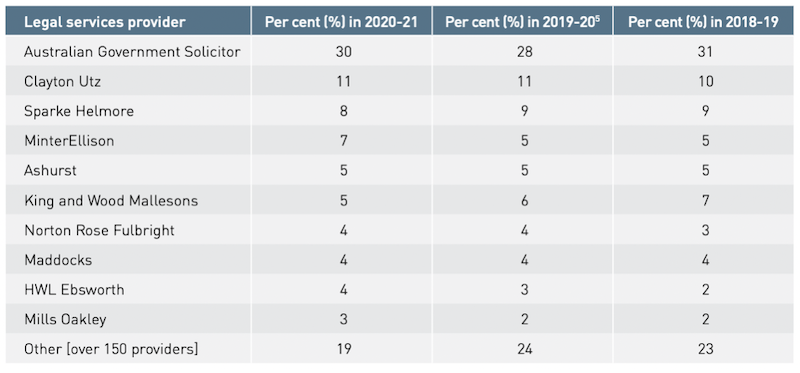Law firms are big winners in government funded litigation bonanza. Rex Patrick reports on the lawyers’ picnic, the spiralling public bills which go unchecked by politicians and bureaucrats because “it’s not their money”.
People were rightly outraged at the prosecution of Bernard Collaery, a whistleblower who called out the government for stealing oil and gas revenues from the newly independent and impoverished East Timor. But people were also outraged at the legal costs associated with the persecution – $5,421,115 at last count, and still going as some of the unresolved legal issues are settled.
In financial year 2020-21 the federal government spent $1.05 billion of taxpayer’s money on legal services. This is up from $826 million in 2016-17, $857 million in 2017-18, $951 million in 2018-19 and $1.02 billion in 2019-20.
This incredible cost and its awful trajectory warrants inquiry, because a sample of cases suggest it’s not about an increase in litigation.
There’s both the overzealous instigation of proceedings contrary to the public interest coupled with a lawyers’ picnic unchecked by officials who don’t really care about the cost because it’s not their money; it’s just taxpayers’ money.
The Collaery matter is a case in point. But there are others.
Seven against one
From 2011 to 2014 the Department of Human Services spent more than $600,000 in a dispute with a child support recipient over $6000. The father involved had offered to settle the matter over “coffee and cake” early on in the piece, even offering to supply the cake himself.
Figure 1 – Departmental Answer to a Senate Question on Notice
Apart from the apparent stupidity of the litigation, questioning from then senator Nick Xenophon revealed that, for one court case in the battle, the father’s legal costs were $71,459 while the department’s legal costs were $369,238.
That led Xenophon to ask the obvious question. “So the costs to the department were five times that of the other party. I am trying to understand the rationale for that … ”.
The department’s response was that “it was necessary for the Department to obtain extensive legal advice and for the Department’s external lawyers to prepare and make detailed submissions to the Court.”
Xenophon responded, “The father’s lawyer and barrister team would have done the same thing. I do not understand the massive cost differential.”
There is no reasonable explanation for the differential, although the fact that at one stage the Department had fielded seven taxpayer funded lawyers to fight the legally untrained father might have had something to do with it.
Radioactive charges
More recently a more extravagant contrast was uncovered in a response to a question from Senator Barbara Pocock (Greens, SA), where the Commonwealth revealed that its costs in litigating the Barngarla Determination Aboriginal Corporation (BDAC), who are aggrieved by the process the government undertook in selecting Kimba, on the Eyre Peninsula, as a site for the National Radioactive Waste Management Facility, were $9,905,737.
This compared to $124,000 that had been spent by BDAC on its lawyers.
The lopsided approach not only raises questions about extravagance on the Commonwealth’s side, it also suggests the Commonwealth is breaching its model litigant obligations by significantly out-resourcing any challenger to Government.
There’s no such thing as a fair fight against government.
Gravy train
There’s also strong evidence that officials have created a gravy train for big-end-of-town legal firms.
Figure 3 – Top 10 Providers over Three years
Legal practitioners are required to disclose information in relation to legal costs to a client as soon as practicable upon taking instructions from the client. That includes for government clients too.
This is necessary to empower the client vis-à-vis the lawyer, by giving the client the opportunity to make an informed choice costs-wise whether or not to retain the lawyer or to continue with the representation.
The Commonwealth obtains cost estimates from its lawyers, but doesn’t hold those lawyers to anywhere near their estimates.
In a case I ran and won to gain access to a document that Attorney-General Christian Porter censored from the Parliament, the initial cost estimate from the Australian Government Solicitor (AGS) was $48,000. The final charge to the taxpayer was more than double that at $126,176.
I another case I brought to ensure the government couldn’t wrap a secrecy blanket over the submissions to and decision of the meeting they called “National Cabinet”, the AGS estimated the total cost would be $20,000 but then went on to charge the taxpayer more than five times that: $107,939.
Having lost the National Cabinet case to me, the government is now back in the AAT spending its unlimited funding to try to reverse the loss.
Finally, in proceedings still on-foot in the Federal Court to force to Information Commissioner to conduct Freedom of Information reviews in a reasonable time frame, the government’s contracted lawyers, Norton Rose Fulbright Australia, told the court their costs were estimates at $160,000. The bill to the taxpayer, revealed in response to a question by Senator Shoebridge currently stands at $ 543,980 … and rising.
Half a million squandered by Information Commissioner on frustrating public’s right to know
The estimates mean nothing. The Commonwealth ends up not making good choices as to whether litigating represents value for money. They essentially sign a blank cheque at the start and hand it to the law firms to fill the number in at the end.
Action required
The overall government expenditure on legal services is rising much faster than inflation. Spending on a case-by-case basis is like a runaway gravy train. It affects the taxpayer in two unfortunate ways. First, they’re paying for it.
Second, the whole arrangement operates to shut the majority of the population out from redress. If a person is unsuccessful in proceedings against the government, bloated adverse costs orders can spell the end.
Even the wealthy shy away from seeking legal remedy to government actions knowing that if they win, an appeal by the infinitely resourced officials is likely, because the officials don’t actually pay on their side. Taxpayers do.
It would not take much for the Senate to look into the issue.
Remedies are needed on both the government and legal firm side of the ledger. Greater transparency is required on a case-by-case basis. MP’s and senators and the public need to be able to see when a gravy train is leaving the station.
MPs and senators need to be alerted as to the size of the teams that government is putting up against private litigants. Do we mind if the ATO uses a big team to take on a multinational? No! But seven lawyers against an untrained litigant is overkill.
And government departments have to stop their expensive secrecy culture. In my own situation the government has spent more than a million dollars trying to keep secret, under Freedom of Information laws, documents and information that should have been made freely available without request.
Legal firms which do work for the government need to reconsider their conduct as well. Their principals need to remind themselves as to why they and their staff entered the profession; presumably to help people. It’s not OK to let the system continue to function in the way it does.
They’re not just bleeding taxpayers’ dry, they’re stopping the very people that might need help from ever standing at the other end of the bar table to test a government’s actions for unlawfulness. And that hurts democracy.
One thing’s for sure, the lawyer’s big taxpayer funded picnic party has to stop.
Parliament’s Department of Cover-Ups faces bullying claims, tangle of lawsuits
Rex Patrick is a former Senator for South Australia and, earlier, a submariner in the armed forces. Best known as an anti-corruption and transparency crusader, Rex is also known as the "Transparency Warrior."




